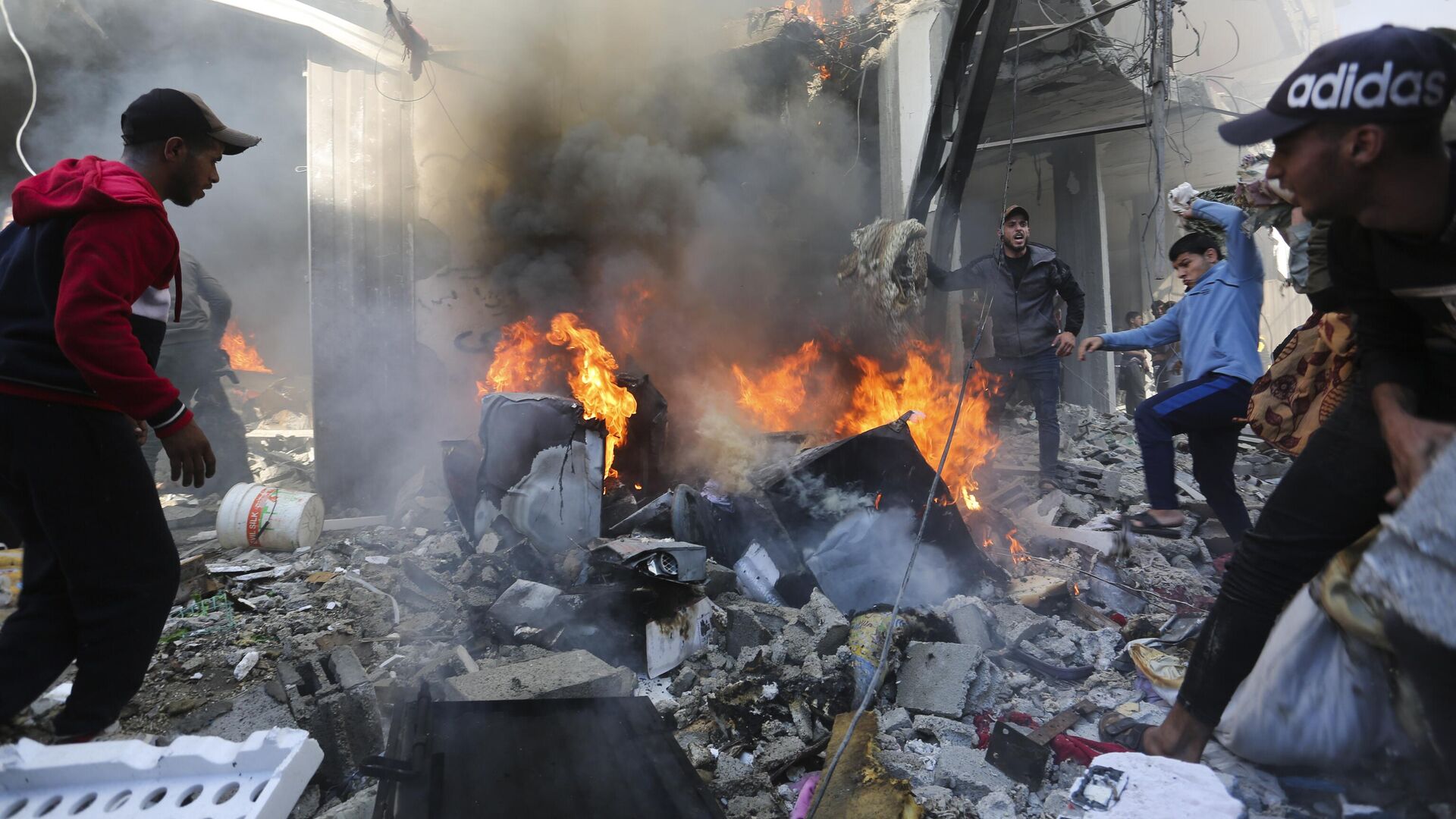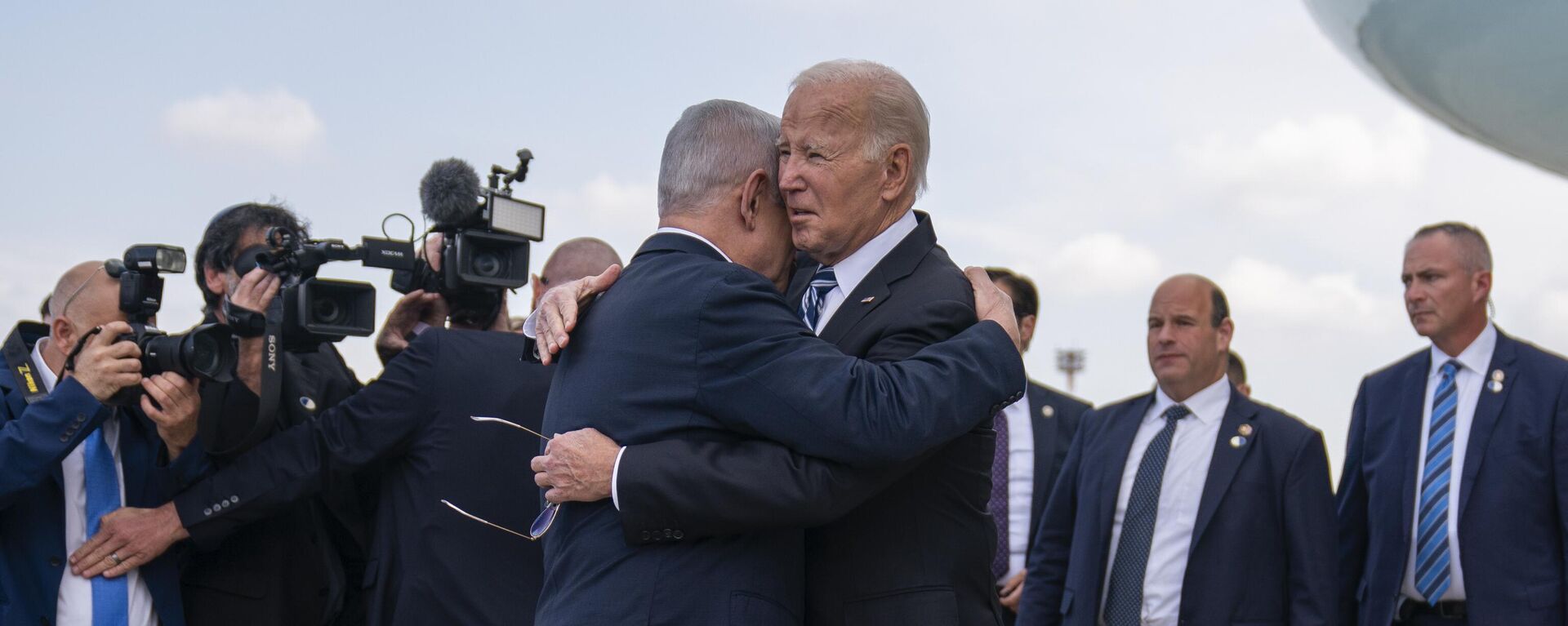Palestinians in Gaza Rely on Luck to Survive Deadly Israeli Bombings: Activist

© AP Photo / Hatem Ali
Subscribe
MOSCOW (Sputnik) Tommy Yang - In light of the military conflict that has gripped the Gaza Strip since October 7, resulting in the deaths of more than 14,000 people in the enclave, a Palestinian activist told Sputnik about his family's ordeal in recent weeks and how they narrowly escaped the devastating bombings.
In response to the surprise invasion of Hamas militants into Israeli towns bordering Gaza in early October, Israel launched a large-scale military campaign, including lethal air strikes and ground operations in Gaza in an apparent attempt to seek vengeance. Thousands of Palestinians have reportedly been killed during Israel’s military operations in Gaza, where hospitals and refugee camps were not safe from the round-the-clock bombing attacks. At the same time, the Israel Defense Forces (IDF) has said it is carrying out targeted operations against the Palestinian movement in the enclave, saying it is "at war with Hamas, not with the civilians in Gaza."
Earlier in the day, however, both sides in the conflict confirmed that they had agreed to a four-day ceasefire in Gaza, with the cessation of all hostilities and the release of 50 Israeli hostages in exchange for 150 Palestinian prisoners.
Make Sure Someone Survives
For Palestinian families living in Gaza, many of them faced an impossible choice when trying to stay alive during Israel's deadly air strikes.
"Even when Israel asked people to leave and they sent leaflets from the sky to the people, a lot of families didn’t want to leave for some days because they didn’t want to have the same experience as their grandparents had. Becoming refugees for a second time is not something pleasant. And it triggers all the old traumas. It felt like a huge failure to the promise we made to our grandparents to return to our home. It’s a betrayal to ourselves," Majed Abusalama, a Palestinian activist who has been advocating peaceful resistance against Israel for decades, told Sputnik.
Although Abusalama now lives in Germany, both his parents and his younger brother’s family continue to live in the Jabalia refugee camp in Gaza.
When Israel issued warnings of impending air strikes and asked over 1 million Palestinians to relocate to the southern part of Gaza, many Palestinians like Abusalama’s father chose to stay put.
"In the beginning, my father didn’t want to leave the house," Abusalama, 35, said.
Following some discussions, Abusalama’s family came up with an unimaginable and desperate plan to try to make sure at least one family member would survive the deadly bombings.
"After talking to each other, they wanted each one of them to stay in different houses. That’s because they have seen the hardship. Many people were bombed and their entire family was erased, as Israel was going criminally insane. In this way, at least, there will be one member of our family that would survive. That’s why they went to three places. My father stayed at our home. My mother went to her brother’s place, which was a little bit to the south. And my brother, his wife and my two nieces stayed at their house. It was a discussion of who dies first. Imagine this is a discussion you need to have with your parents," the activist said.
As the bombs fell closer and closer to their homes, Abusalama’s family were forced to evacuate together to another refugee camp in central Gaza.
"But after some days, my parents decided to evacuate because the area they were in was at the edge of the [Jabalia refugee] camp. If any land invasion [from Israel] happened, they would be in danger. That’s why they decided to evacuate to the more southern part of Gaza," he said.
After living in different houses for about two days, Abusalama's family also realized that they wanted to stay together even if they were killed in the bombings.
"It was a very difficult question. They eventually decided that if they were going to be killed, they would rather be killed together," he said.
Abusalama’s parents and his brother’s family evacuated to the Nuseirat refugee camp, located in the middle of Gaza, and moved into a two-room apartment. Abusalama’s uncle and his family also lived in the same apartment. More than 20 people, including young children, stayed in the same two-room apartment.
According to Abusalama, his family was able to stay alive mostly because of how lucky they were.
"Our car was completely destroyed when a bomb fell in front of it. If they were in the car, they would have been killed. My mom went to a supermarket. One minute after she left the supermarket, it was bombed. It’s not easy. I’m glad that they’re alive today. But there were many times when they could have been killed. They were just lucky to be one minute late or to have left one minute earlier," he said.
Unfortunately, some of Abusalama’s relatives were not so lucky.
"My adopted brother Yousef, the entire family of my cousin Khalil, including his wife and three children, and my cousin Rana and her two children, were all killed [in the recent Israeli air strikes]," he said.
In addition to the deadly air strikes, Palestinians who have survived, like Abusalama's family, have had to deal with the lack of basic necessities.
"They’re struggling to find water to drink and shower. They’re drinking contaminated water. They eat only once a day because they don’t have enough food. They actually have no plan. It’s the plan of the universe to decide if they’re killed or not. Even if they wouldn’t die from a bomb, they might be killed because of hunger," Abusalama said.
Although a limited number of trucks carrying humanitarian aid have been allowed into Gaza, the supplies have fallen far short of meeting the basic needs of the population. Palestinians could only rely on each other to get through this difficult time.
"I think only 150 or 200 trucks that were allowed to enter. But this is nothing compared to the needs of Gaza. It’s all about the solidarity between the people [in Gaza]. My family had water. They gave the water to help their neighbor cook. When they had bread, they would cut it into pieces and share it with everyone," Abusalama said.
Everybody Had a Relative in Jail
Similar to many other families in Gaza, Abusalama’s grandparents were forced to move to the Jabalia refugee camp in 1948, when hundreds of thousands of Palestinians were displaced during the war.
"It’s about the Nakba [a term meaning catastrophe in Arabic, used to describe the displacement of Palestinians in 1948]. My grandparents were displaced as part of the ethnic cleansing in 1948. They moved to the Jabalia refugee camp in the north of Gaza. Both of my parents were born there. They lived through many invasions and a lot of hardships and shortages of many things. They got educated and then they got us. We were born in the First Intifada [popular uprisings of Palestinians against Israel in the late 1980s and early 1990s]. We grew up in the Second Intifada [from 2000 to 2005] and the blockage. We grew up through colonial torture," Abusalama said.
As a result, Abusalama's family, like many other Palestinians, has a long tradition of resistance to Israel.
"My father was born in 1952 and my mother was born in 1965. They all were political activists. Everybody in Palestine is a political subject. You learn to fight at a young age. This is the story of every colonized and oppressed [person]. I think whenever you’re attacked, you fight back, right?" Abusalama said.
Abusalama’s father paid a hefty price for his activism in the Palestinian resistance.
"My father was a freedom fighter. He was arrested in 1972 and was sentenced to 18 years in jail. My father was in jail when I was born. He was in jail when my sister was born. But this is not the first [such case]. In Palestine, more than 1 million Palestinians were in jail from 1967 until today. Almost everybody had a relative who was in jail," he said.
Abusalama went on to explain why it was natural for him to become an activist.
"As a political being since childhood, we have a moral duty to liberate our people. I will do anything to highlight and advocate for the Palestinian struggle for liberation. This was part of my long family and personal struggle to advocate, fight and resist the settler-colonial regime. I wanted to set many different examples that resistance is possible to fight the Israeli settler colonial regime," he said.
Bullet in the Leg
The activist was shot in his lower leg in January 2014, when he took part in a peaceful demonstration in the "buffer zone" Israel set up.
"I co-founded an organization called the Intifada Youth Coalition. We were doing nonviolent activities at the border. When I was shot, we were planting citrus trees and olive trees at a security area called the ‘buffer zone.’ The ‘buffer zone’ is a security area Israel stole from the Palestinian farmers. It took away about 27% of agricultural land of Gaza. They took it and they forbid us to farm and plant our food there. They destroyed all the forest just for their fake security excuses," Abusalama said.
Knowing how Israeli soldiers dealt with protesters before, the activist was well aware of the potential danger of being shot while planting trees in the "buffer zone."
"We expect everything from them. We’re dealing with a criminal colonial regime. Colonial regimes have never been nice to the colonized. There have been many aggressions when they killed thousands of us and bombed hundreds of houses. We never expected Israel to be nice to us. They’re the most criminal country and military on the planet. It’s not anything new to us," he said.
Three months after being shot in the leg, Abusalama was finally able to leave Gaza to attend a speaking tour at various universities in different countries, continuing to advocate for Palestinians.
He eventually settled down in Germany to complete two Master's degrees and was in the process of finishing his PhD.
Unfortunately, as he was a well-known activist, Abusalama feared he wouldn’t be allowed to leave Gaza again if he went back to visit his family. The activist has not been able to visit his family in Gaza since 2014. He has only met with his family members twice since then, after some of his family members were allowed to travel to Germany through Egypt.

